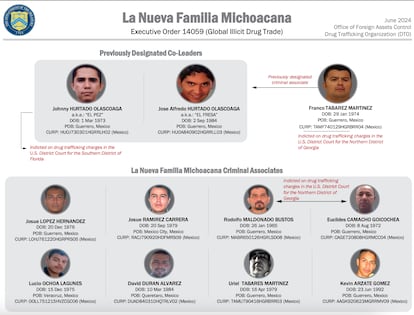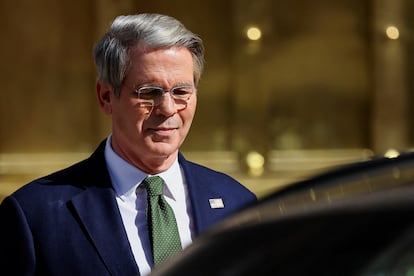The US targets La Familia Michoacana in its crusade against fentanyl
On the same day, the Treasury Department sanctioned the two leaders of the criminal organization, a Georgia court indicted them, and the State Department offered $8 million for their capture


In his personal crusade against fentanyl—the latest chapter in the United States’ long-running war on drugs — Donald Trump is now setting his sights on La Familia Michoacana. Washington has accused the Mexican criminal organization, primarily based in Guerrero and Michoacán, of trafficking “fentanyl, methamphetamine, heroin, and cocaine” into the U.S.; laundering the profits through the U.S. financial system; “poisoning” the American public; and engaging in “acts of terror and violence in Mexico.”
On Tuesday, the U.S. Treasury Department announced economic sanctions against the group’s two leaders — brothers Johnny “El Pez” and Jose Alfredo “El Fresa” Hurtado Olascoaga — along with two of their lower-ranking siblings in the organization, Adita and Ubaldo. The State Department has also offered an $8 million reward for their capture, while a federal court has charged them with drug trafficking.
The United States has declared war on the Hurtado Olascoaga brothers on multiple fronts. The announcement of sanctions was accompanied by a federal grand jury indictment in the Northern District of Georgia, charging El Pez and El Fresa with “conspiracy to manufacture and distribute controlled substances (specifically, heroin, methamphetamine, cocaine and fentanyl) knowing they would be imported into the United States,” as well as conspiracy to import and distribute those drugs. On Tuesday, the State Department put a price on their heads: $5 million for Johnny and $3 million for José Alfredo.
The U.S. sanctions represent both a symbolic and financial blow. The measures not only highlight La Familia’s profile as international drug traffickers, but also allow Washington to seize “all property and interests in property,” including any bank accounts the four cartel leaders may have registered in the United States. “The Trump administration will continue to use all available tools to target the cartels and other violent organizations that attempt to exploit our communities and harm Americans,” said Treasury Secretary Scott Bessent in a press release.
The Treasury Department also identifies La Familia Michoacana — referred to in its statement as La Nueva Familia Michoacana — as responsible for human trafficking and the smuggling of undocumented migrants into the United States. It accuses the group of using violence “against its rivals and Mexican security forces,” including the use of “drones and bombs in addition to conventional firearms,” with “utter disregard for Mexico’s civilian population.” According to the statement, the cartel members also “terrorize local communities through kidnappings, killings, and extortion.”

As part of its broader offensive against Mexican cartels — whom Donald Trump blames for the public health crisis fueled by widespread fentanyl use in the United States — Washington designated six Mexican criminal organizations as terrorist groups in February. Among them was La Familia Michoacana. Mexico “is essentially run by the cartels,” said Trump. A day later, Canada followed in the White House’s footsteps.
This latest wave of U.S. measures against La Familia Michoacana marks a new escalation in the offensive launched in February, coordinated by the Drug Enforcement Administration (DEA) along with the Departments of Treasury, State, Justice, and Homeland Security — supported south of the border by Mexico’s Financial Intelligence Unit. The operation signals a new era of cooperation between the two countries, which Mexican President Claudia Sheinbaum has championed.
The U.S. pursuit of La Familia Michoacana is not new. In November 2022, the Office of Foreign Assets Control (OFAC) accused the group of drug trafficking and sanctioned the Hurtado Olascoaga brothers. The Treasury Department’s latest announcement expands the spotlight to include two more of their siblings. Ubaldo is described as “a senior leader” involved in drug trafficking and extortion, who oversees the group’s hitmen and has “illegally mined and extracted mercury and uranium for the organization.”
Adita, meanwhile, is identified as a financial operator responsible for laundering the cartel’s profits through “used clothing stores along the Rio Grande Valley” in Texas. “This trade-based money laundering scheme includes the purchase of used clothing in the United States and their shipment to Mexico, where the used clothing is sold,” explains the statement. OFAC also accuses her of smuggling American firearms into Mexico.
Trump’s measures aren’t aimed solely at La Familia Michoacana. His administration considers the Sinaloa Cartel and the Jalisco New Generation Cartel — the two most powerful criminal organizations in Mexico — as the primary drivers of fentanyl trafficking into the United States. At the end of March, the U.S. intelligence community released a report in Washington highlighting the growing role of “independent producers” of the potent opioid.
Intent on blaming Mexico for the fentanyl crisis, Trump has placed a heavy strain on the bilateral relationship. Since the billionaire took office in January, Sheinbaum has handed over 29 drug lords, deployed more than 10,000 troops to secure the shared border, seized record amounts of fentanyl, and authorized U.S. surveillance in Mexican airspace.
Sign up for our weekly newsletter to get more English-language news coverage from EL PAÍS USA Edition
Tu suscripción se está usando en otro dispositivo
¿Quieres añadir otro usuario a tu suscripción?
Si continúas leyendo en este dispositivo, no se podrá leer en el otro.
FlechaTu suscripción se está usando en otro dispositivo y solo puedes acceder a EL PAÍS desde un dispositivo a la vez.
Si quieres compartir tu cuenta, cambia tu suscripción a la modalidad Premium, así podrás añadir otro usuario. Cada uno accederá con su propia cuenta de email, lo que os permitirá personalizar vuestra experiencia en EL PAÍS.
¿Tienes una suscripción de empresa? Accede aquí para contratar más cuentas.
En el caso de no saber quién está usando tu cuenta, te recomendamos cambiar tu contraseña aquí.
Si decides continuar compartiendo tu cuenta, este mensaje se mostrará en tu dispositivo y en el de la otra persona que está usando tu cuenta de forma indefinida, afectando a tu experiencia de lectura. Puedes consultar aquí los términos y condiciones de la suscripción digital.








































